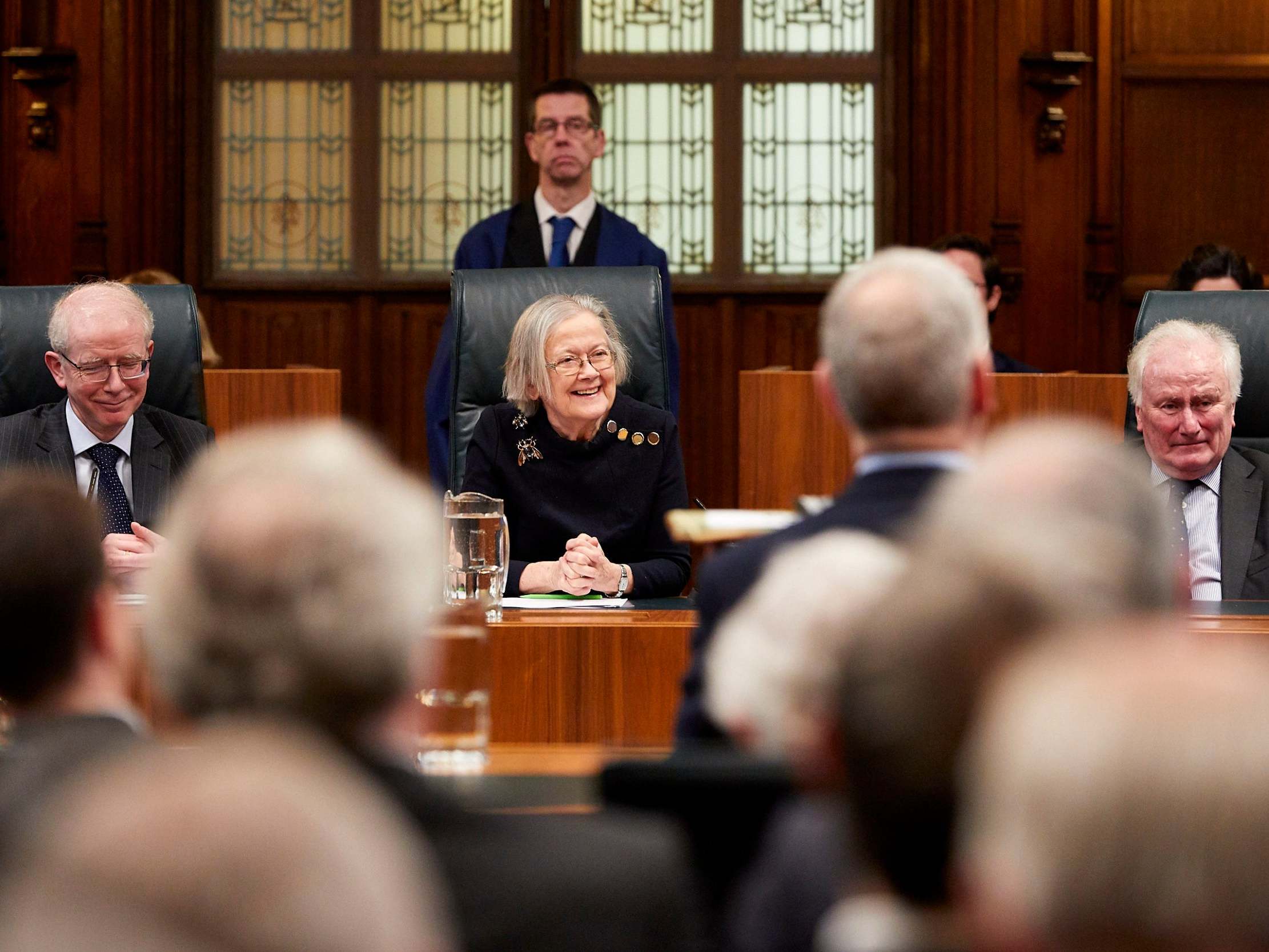Lady Hale warns government against US-style ‘politicisation’ of court appointments
‘We don’t want to be politicised,’ says outgoing Supreme Court president – who also condemns ‘unfortunate’ press attacks on top judges
Your support helps us to tell the story
From reproductive rights to climate change to Big Tech, The Independent is on the ground when the story is developing. Whether it's investigating the financials of Elon Musk's pro-Trump PAC or producing our latest documentary, 'The A Word', which shines a light on the American women fighting for reproductive rights, we know how important it is to parse out the facts from the messaging.
At such a critical moment in US history, we need reporters on the ground. Your donation allows us to keep sending journalists to speak to both sides of the story.
The Independent is trusted by Americans across the entire political spectrum. And unlike many other quality news outlets, we choose not to lock Americans out of our reporting and analysis with paywalls. We believe quality journalism should be available to everyone, paid for by those who can afford it.
Your support makes all the difference.The outgoing president of the Supreme Court has warned against any attempt by the government to “politicise” the appointment of judges.
Lady Hale, one of the country’s most senior judges, defended the independence of the judiciary amid fears Boris Johnson’s government could push for the political appointment of top judges.
“We don’t want to be politicised,” said Baroness Hale of Richmond, who retires next month. “We don’t decide political questions, we decide legal questions. And in any event, parliament always has the last word.”
Lady Hale also criticised recent attacks on the judiciary by the press – including the notorious headline in The Daily Mail branding three senior judges “enemies of the people”.
She said: “They’re unfortunate. We have a free press and if the press wants to attack us, that’s fine. But we have to continue to do the job according to our judicial oaths … we certainly do not pay any attention to attacks of that nature.”
In the immediate aftermath of the Supreme Court ruling on the prorogation of parliament as “unlawful”, the attorney general Geoffrey Cox said it could be time for “parliamentary scrutiny” of judicial appointments.
He later said the government had no “current plans” to do so, and insisted US-style hearings “would be a regrettable step for us in our constitutional arrangements”.
But both the Conservative manifesto – which hinted at curtailing the power of the courts to rule on political matters – and Mr Johnson’s decision to order reviews of the constitutional settlement and the justice system have raised concerns about how far reform might go.

As part of a guest-editing role on BBC Radio 4’s Today programme, Lady Hale said: “We do not want to turn into the Supreme Court of the United States, whether in powers or in process of appointment.”
Asked what would happen if politicians did get to scrutinise or decide appointments, she said: “I don’t know what would happen – I do know that there is no member of the judiciary, or indeed most of the legal profession, who would favour the politicisation of judicial appointments. We have an independent, merit-based appointment which most of us are extremely comfortable with.”
She rejected the idea the Supreme Court had overstepped the mark during the prorogation ruling. “I don’t think we generally force governments to do things they don’t want to do,” she said. “The courts from time to time tell governments or public authorities that what they do want to do is not lawful.”
Lady Hale also spoke out on spending cuts causing “serious difficulty” for the justice system. She said the problems are particularly apparent in the family courts.
“The lack of access to legal services for some people who seriously need them in the areas which most affect their ordinary, everyday lives – that is a problem,” she said.
“It is a particular problem in family law – disputes between husband and wife, mother and father – where there may be an imbalance in resources because of the lack of access.
“Most people need legal services at the beginning of a difficulty, and if they have them then it will be sorted out and they won’t have to go anywhere near a court or they won’t have their house repossessed or whatever because somebody has managed to find a solution to the problem at an earlier stage. It is that lack of initial advice and help which is a serious difficulty.”
In her valedictory statement in the Supreme Court earlier this month, Lady Hale said: “We do not want to turn into the Supreme Court of the United States, whether in powers or in process of appointments.”

Join our commenting forum
Join thought-provoking conversations, follow other Independent readers and see their replies
Comments